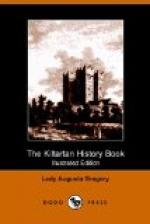A LONG REMEMBERING
“The longest thing I remember is the time of the sickness, and my father that was making four straw mats for four brothers that died, and that couldn’t afford coffins. The bodies were put in the mats and were tied up in them. And the second thing I remember is the people digging in the stubble after the oats and the wheat; to see would they meet a potato, and sometimes they did, for God sent them there.”
THE TERRY ALTS
“The Terry Alts were a bad class; everything you had they’d take from you. It was against herding they began to get the land, the same as at the present time. And women they would take; a man maybe that hadn’t a perch of land would go to a rich farmer’s house and bring away his daughter. And I, supposing, to have some spite against you, I’d gather a mob and do every bad thing to destroy you. That is the way they were, a bad class and doing bad deeds.”
THE ’48 TIME
“Thomas Davis was a great man where poetry is concerned, and a better than Thomas Moore. All over Ireland his poetry is, and he would have done other things but that he died young. That was the ’48 time. The ’48 men were foolish men; they thought to cope with the English Government. They went to O’Connell to get from him all the money he had gathered, for they had it in their head to use that to make a rise against England. But when they asked O’Connell for it he told them there was none of it left, not one penny. Buying estates for his children he used it, and he said he spent it on a monastery. I don’t know was he speaking truth. Mahon made a great speech against him, and it preyed on O’Connell, and he left the country and went away and died in some place called Genoa. He was a very ambitious man, like Napoleon. He got Emancipation; but where is the use of that? There’s Judge O’Brien, Peter the Packer, was calling out and trying to do away with trial by jury. And he would not be in his office or in his billet if it wasn’t for O’Connell. They didn’t do much after, where they didn’t get the money from O’Connell. And the night they joined under Smith O’Brien they hadn’t got their supper. A terrible cold night it was, no one could stand against it. Some bishop came from Dublin, and he told them to go home, for how could they reach with their pikes to the English soldiers that had got muskets. The soldiers came, and there was some firing, and they were all scattered. As to Smith O’Brien, there was ten thousand pounds on his head, and he hid for a while. Then at the last he went into the town of Clonmel, and there was a woman there in the street was a huckster, and he bade her give him up to the Government, for she would never earn money so easy. But for all she was worth she wouldn’t do that. So then he went and gave himself up, and he was sent to Australia, and the property was given to his brother.”




